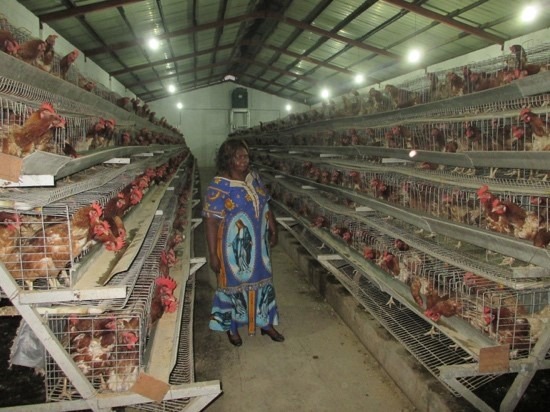
Victorine Bujakera is a farmer and member of a cooperative called the Coopérative des Fermiers de Kinshasa in the Democratic Republic of Congo (DRC). She is a nurse by training, but for the last 10 years has raised poultry at home with her husband. She began poultry farming with layer chickens (chickens raised to produce eggs), despite having no prior training in poultry husbandry.
Victorine and her husband had 2,000 layers that they fed with commercial feed procured from local mills owned by large agro-industrial firms in Kinshasa. Unfortunately, these large firms also raised layers, and thus set the prices for the market. Small farmers like Victorine could not compete in the local market without additional resources. That’s when she realized she could become a stronger competitor by using the credit and financing services offered through her cooperative, which was formed with help of volunteers from the USAID-funded Farmer-to-Farmer (F2F) Program.
Farmer-to-Farmer Volunteer Training Inspires New Opportunities for Poultry Farmers
In 2015, Dr. Jennifer Bowman conducted an ACDI/VOCA volunteer assignment with F2F in the DRC. While there, she completed a two-week technical training on poultry disease and prevention with the National Crusade for Food Security, or Croisade National pour la Sécurité Alimentaire (CNSA)—the group that preceded the Coopérative des Fermiers de Kinshasa. During the training, Dr. Bowman visited Victorine’s poultry barnyard to discuss health and hygiene concerns associated with poultry farming at home. Because of this training, Victorine and her husband decided to build a new chicken barnyard on land located on the outskirts of Kinshasa. While visiting the new site, Dr. Bowman advised them on how to orient and construct it. Two years later, Victorine’s poultry production business has grown from 2,000 to 5,000 layers, which she now feeds using more cost-effective poultry feed produced by the Coopérative des Fermiers de Kinshasa. Her business continues to grow at the new site away from her and her husband’s home.
“We buy poultry feed at a relatively low price compared to feed produced by the agro-industrial companies. If I do not have enough money to pay in cash, the cooperative gives us the feed as a loan that we pay 10 [days] after delivery of the feed. Our egg production is 15 percent higher than the production we had when we raised chickens at home.” – Victorine Bujakera








